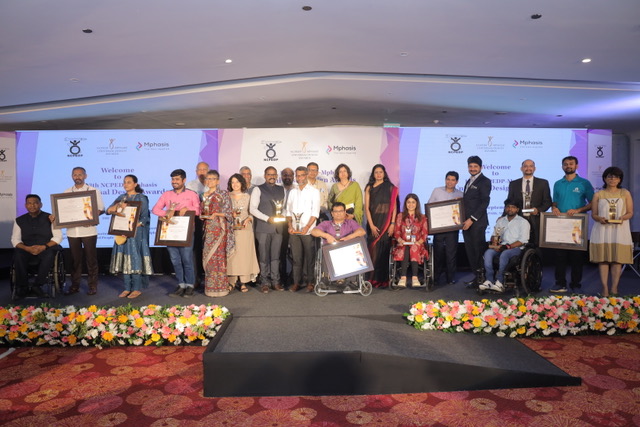
14 innovators from 8 Indian states bag NCPEDP-Mphasis Universal Design Awards

Most techies are great at spotting problems, but a few also turn problems into opportunities that impact several others in a positive way. This is exactly what Vidhya Y, blind since birth, excels at.
As a child, Vidhya faced several obstacles when it came to studying Science and Maths due to the visual nature of the subject instructions. Yet she excelled in both the subjects and went on to bag a gold medal from the International Institute of Information Technology, Bangalore (IIIT-B) and interned at Microsoft.
In 2017, Vidhya founded a non-profit organisation, Vision Empower, with a mission to make STEM (Science, technology, engineering, and mathematics) education accessible to visually-impaired students so that no child has to face the challenges that she had to. Vidhya also co-founded “Vembi Technologies” to design and manufacture assistive technologies to cater to the educational needs of children with visual impairments.
On Wednesday, September 28, Vidhya’s work was acknowledged and honoured at the 13th NCPEDP-Mphasis Universal Design Awards, along with 14 other innovators.
Also read: People with disabilities in India left behind amid COVID-19 crisis
The Universal Design Awards were instituted in 2010 by the National Centre for Promotion of Employment for Disabled People (NCPEDP) in partnership with Mphasis, an information technology solutions company. Universal design is the design of buildings, products or environments to make them accessible to all people, regardless of age, disability, or any other factor.
Speaking about the mission behind this unique award, NCPEDP Executive Director Arman Ali said, “Seventy five years after India’s independence, it’s time to step up efforts to ensure absolute freedom for the disabled. The Universal Design Awards is a definitive move forward to recognise and celebrate ideas and innovations that promote accessibility and universal design–be it in physical infrastructure, transport, products or services. It is given to those individuals or organisations who are doing exemplary work to create a level-playing field for people with disabilities to access the same opportunities and rights as all other citizens of India.”
According to Mphasis Chief Human Resources Officer Srikanth Karra, the awards were conceived to celebrate individuals as well as organisations for developing new technologies and innovations that enable accessibility and universal design. “We believe that this award showcases how innovation is not just about accessibility but about access, and inclusion without barriers.”
Much like what Karra said, chess genius Soundarya Kumar Pradhan believes this felicitation was more than a mere award. “It is a giant leap forward in driving awareness on universal design,” said Pradhan, one of the awardees. Pradhan, who hails from Odisha, has been 100% blind since birth.
Working as Manager, Finance Systems Operations at HSBC Electronic Data Processing India, Prashan has developed a website that makes chess accessible for blind chess players. The 22-year-old from Odisha won a gold medal in the 2022 IX IBCA World Team Chess Championship for the blind held at Ohrid, Macedonia from July 28- August 7. In 2018, he won the silver medal at the World Junior for Blind and Visually Impaired 2018, creating a new record for India. His achievement in the tournament held in Solec Zdroj in Poland was the best-ever performance at the time by an Indian at the world juniors for the visually challenged, according to Chessbase India.
Equally inspirational is the story of Delhi’s Lalit Kumar.
Also read: Persons with disabilities bear the brunt of coronavirus lockdown
Chairman and Managing Trustee of Evara Foundation. Lalit is credited with launching the mission for establishing a disability-centric literary movement in Hindi and other Indian languages. A software developed by Kumar, which is the first free Braille translator for Indian languages – Hindi, Bangla, Gujarati, Kannada, Malayalam, Marathi, Nepali, Odia, Punjabi, Sanskrit, Tamil and Telugu – is an important step towards enhancing the accessibility of Indian language text material for persons with blindness and low vision.
Kumar has also established India’s biggest disability-centric YouTube channel, Dashamlav. Besides, his autobiography, Vitamin Zindagi, has been translated into many languages. On Wednesday, Kumar was also among the 14 recipients of the awards that were conferred under three categories: persons with disabilities, working professionals and companies/organisations that have created an impact in accessibility and Universal Design in any of the following areas – built environment, transport infrastructure, service provision, information and communication technology (ICT), universally designed consumer products, mobility and independent living aids, or assistive technology in their personal and professional capacities.
The 14 receipts also included activist-educator Merry Barua, who was honoured with this year’s Javed Abidi Public Policy Award. Barua is credited with pioneering the autism movement in India. Her organisation Action for Autism (AFA) provides services spanning early identification, education, work and employment, and assisted living as models for replication, where accessibility for autistic people is at the core. In 2015, INSAR (International Society for Autism Research) recognised Merry’s efforts with the prestigious ‘Advocate Award’.
“The 14 awardees belong to eight states across India. Awareness of universal design is close to none and there have been very few attempts to educate stakeholders about this. As the awards enter its 13th year in 2022, we sincerely hope that this is just the beginning in creating an inclusive world for persons with disabilities, where barriers to accessibility cease to exist,” added Arman Ali.


